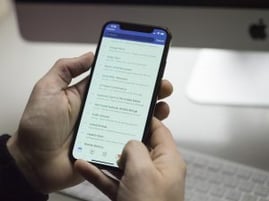We all have our own preference. Whether you’re a loyal Apple customer, or you’ve never been tempted to put distance between your thumbs and your Samsung device, one thing we’re all concerned about is mobile security.
We want to know that our mobiles can double-up as personal and customer data vaults and that we can rely on to support us in our daily work. But if you are flipping a coin and deciding whether iOS or Android is going to give your network of mobile employees the most secure and robust devices, you might want to think about which operating system has that enhanced security edge…
It’s estimated that there will be six billion mobile devices by 2020. Whilst laptops and computers are looking to experience a decline, they’ll still be necessary in the workplace. Businesses want to continue to power their mobile workforces with smart and secure devices (for example through effective MDM).
By using our devices to do more, for example handling transactions, it makes smart phones an alluring target for cybercriminals targeting Android or iOS devices.
 Apple’s iOS has managed to withstand the might of cybercriminals with Android being the operating system more vulnerable to cyber attacks. You may be wondering how this is the case. With Apple’s robust vetting process, apps that want to make their way into the App store have to jump through cyber hoops.
Apple’s iOS has managed to withstand the might of cybercriminals with Android being the operating system more vulnerable to cyber attacks. You may be wondering how this is the case. With Apple’s robust vetting process, apps that want to make their way into the App store have to jump through cyber hoops.
It works: their approach has largely prevented more widespread malware infection. When Apple test and validate their apps, you know that if your employees download content, it’s less likely to cause a device security risk. But the iOS-based malware XCodeGhost has proven that iOS is vulnerable to malicious attacks as well, so educating your staff and making sure you have an effective MDM solution can always minimise the risk.
On the flip-side, Google provides a centralised market for mobile applications called Google Play. But Android’s ability to install apps from third-party sources means that you can never be fully convinced of where an app has come from, including if it has appeared with the help of a malware hotspot.
Free apps that haven’t been properly tested are completely accessible on your business’ mobile devices. The number of threats, particularly on the Android platform continues to increase. SophosLabs have identified more than 1.5 million samples of Android malware since 2010.
So how do you ensure your mobile workforce isn’t getting too app-happy and is considering the importance of security when it comes to mobile devices, iOS or Android?
1. Education
Make sure that your employees know how to protect their mobile devices, carefully consider what apps they’re downloading, and remember that they should only be downloading apps that are needed strictly for business.
2. Wi-Fi woes
Yes, we’re always seeking a connection outside the office, but think carefully before connecting a laptop or mobile device to an open WiFi network that’s not secure. It could expose your business’ network to dangerous malware or make you open to other devices on that open network. Using a VPN can hugely help with this.
3. BYOD policies
Rather than opting for a MDM strategy to implement on corporate devices, you might devise a policy that fits with employee-owned devices instead.
4. Approved apps only
You might consider providing a list of apps that employees can add to their corporate devices, and they have to be from trusted sources only. You could also consider building your own enterprise app store for your mobile workforce.
5. Security, security, security
Securing your devices with encryption, keeping operating systems, Android or iOS up-to-date, and providing cloud-sharing platforms for your business’ employees to store valuable data could also help to secure your network within the office, and outside it.
So, who actually wins?
From the perspective of user privacy and security controls, iOS tends to be the OS of choice for security professionals. This extends through to enterprise users, where corporate security policies and mobile device management (MDM) requirements arguably make iOS the better fit.
But on balance, Android provides more market choice for the consumer (including devices, OS variants, and mobile apps) which accounts for its massive market share and offers greater support to businesses who wish to adopt BYOD policies.
Ultimately, whichever platform you choose, the best form of security exists at the data level - protecting your mobile devices before data is received by the device. To understand your options and how Intercity can support your mobile fleet security, get in touch today.
[subscribe-form]
Subscribe to our newsletter
YOU MAY ALSO BE INTERESTED IN:


